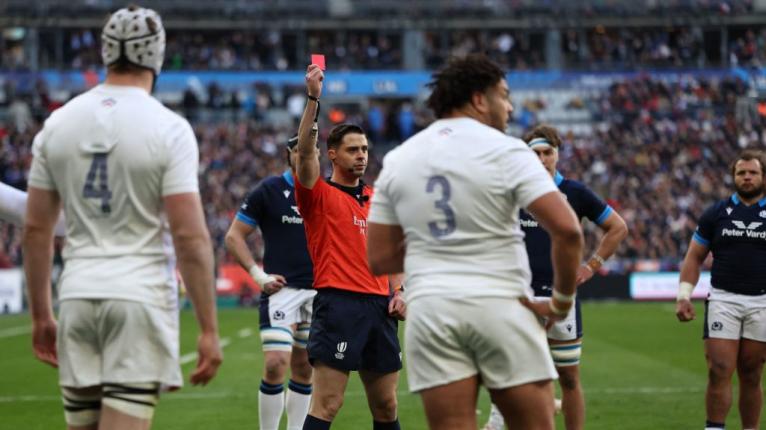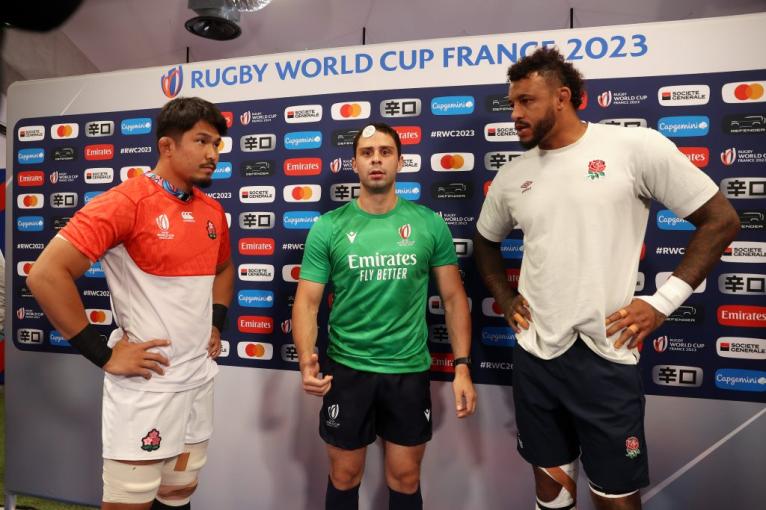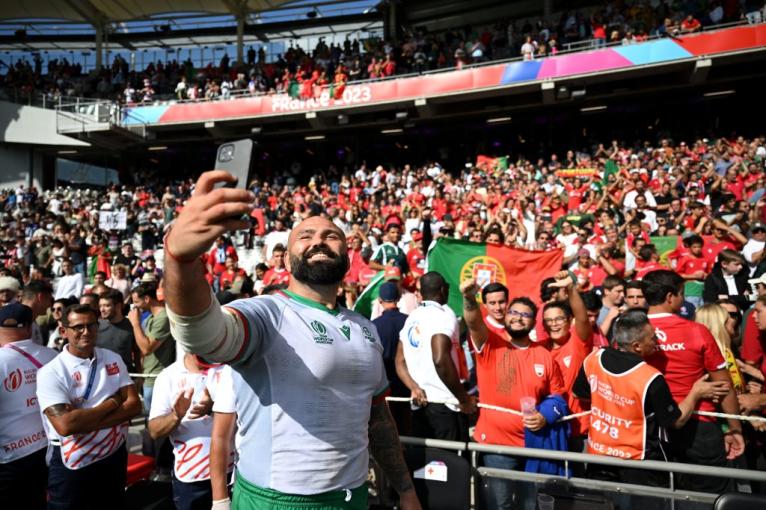It’s raining. The pitch is muddied. The ball jumps and bobbles like it’s alive. A handful of players fight for possession, creating a terse bundle of chaos. The referee blows for a knock-on. A player from one side shouts for a penalty, while a combatant from the other team complains of foul play two rucks earlier. Coaches and supporters weigh in from the touchline, buffeting the referee with their own vociferous opinion and remonstration.
No athlete is perfect in their job, and officials are no different – even if fans, in the heat of battle, forget the person in the middle is a fellow human doing their best. Refereeing is one of the most pressured roles in sport. The official doesn’t want to be seen or remembered as the protagonist, but alas, sometimes the spotlight shines directly on the one with the whistle, leaving a sizzling afterglow of angst, controversy and rancour. Recently, this has strayed far beyond the acceptable boundaries of sporting debate. Part of the game? It shouldn’t be.

Beneath what is often referred to as the ‘Tier One’ nations, a band of exciting, dedicated officials are making their names in emerging rugby territories. These men and women do not always have access to the same remuneration and resources as their counterparts in countries where the game and the refereeing pathway is more established. Their commitment is immense, even in the face of abuse and setbacks.
What do their lives entail? What unique challenges have they faced? And how have they carved out careers in one of the most challenging professions in rugby?
‘There were times I thought about retiring’
Nika Amashukeli was a promising centre, capped by Georgia at Under-20 level, and intent on winning full Lelos honours. Now, he is one of rugby’s finest referees but his career with the whistle began after suffering a head injury in training.
Amashukeli’s first appointment was a chastening experience. Yet rather than reenter the arena as a player, the Georgian opted to pursue Test outings as a referee.
“It was an Under-10s game, and I was completely lost on the field. I tried to go into player channels, couldn’t keep up with the game, and everything was happening too quickly. The parents were very unhappy with me, and I apologised at the end saying it was my first time as a referee and I would be better in the next game. It was a challenge, something so unique to the point I gave up on my playing career. I remember my coach being shocked, but it didn’t make me go back on my decision.”
Amashukeli’s nationality could be seen as an barrier to reaching the highest level and there were moments he wondered whether he could operate alongside the heavyweights of the refereeing scene.
“I am not from a top-tier country. Yes, Georgia is pushing the boundaries and doing brilliantly if I might add, however, when I came into this life it wasn’t easy to get out there. I was just Nika and had to work my way up to the top, especially in creating trust from those from elite settings. I had to prove I could compete.
“I remember the first time I walked into a room with Jerome Garces, Nigel Owens, Wayne Barnes and others, I started questioning myself. ‘Can I match their decision-making? Can I get to their level?’. The overwhelming pressure of officiating an international game, and the possible negative reaction from media and fans, who will question where you are from, and what are you doing there, is another obstacle I had to overcome. With the help of my mentor, David McHugh, I kept developing to claim my place at the top.”

At last year’s Rugby World Cup, the 29-year-old oversaw three pool matches, the latest step on a journey which shows no sign of slowing up. He has seen first-hand the vitriol and bile which can afflict those brave enough to take on the job, and he hopes fervently more can be done to protect today’s referees and inspire those of tomorrow.
“We have to acknowledge some of our mistakes cost teams tries and points, and admitting it is a very important part of a match official’s mindset.
“The abuse online is growing and we have to do something about it. In Georgia, we are struggling due to a shortage of referees, with some doing three to four games in a single weekend, which is an astonishing effort for a human. There should be professional structures in place just to support the officials, especially on the financial front, securing their future. Once those things are established, referees can have a more peaceful environment to tackle the sacrifices they will make in the future. If we want to have determined people working as match officials, we have to provide job security and make them feel safe.”
Indeed, in his decade as a referee, Amashukeli has considered hanging up his whistle more than once. Back in his fledgling days he felt stranded and alone, struggling to make his way.
“Oh yes, and it isn’t that hard a question. There were times I thought about it, especially when I was young. I didn’t feel any support, I was lost and needed guidance. The pressure and exposure sometimes are too much, and you start coming up with doubts, questioning your decisions and if it is all worth it.
“Thankfully I was able to overcome those and kept pushing, and ten years later I’m still here. Even if it looks to be too much rugby sometimes, and that I have little time for my life, that special sensation when I step onto the pitch overpowers all my fatigue and doubts.”
‘I failed; that sensation stuck to me’
Portugal’s Paulo Duarte is another referee who overcame adversity to work in the Test environment. The 36-year-old has been a regular in on the HSBC SVNS and officiated at the Tokyo Olympic Games three years ago.
Like Amashukeli, he began life as a player but was swiftly compelled to take up refereeing in 2006. He starts by sharing a moment which will live with him forever.
“It was in my first year as a match official, and I was scheduled to officiate a U14 match. The game turned out to be vital for the U14 Portuguese Premiership and there was monumental pressure, the stands were packed. It almost seemed like a World Cup final. I don’t even remember who won it, however, I remember my immediate reaction when the game ended… Ferdinando Sousa, the guy who convinced me to take the referee course, came to congratulate me, and I fell to my knees and cried. It was the first time I truly felt the responsibility of officiating a rugby game.”

Duarte describes several obstacles in his path back home. As was the case in Amashukeli’s Georgia, the lack of local structures to guide and help new referees along the way hindered him.
“I had my first international experience in 2012, when I refereed the Rugby Europe Sevens Trophy division. It helped me realise other things that would test me, be it not eating or sleeping well, running non-stop for fifteen minutes straight and doing so for several hours, or the impact of one team winning or losing. I would go on to lose eight pounds in that short period.
“Unfortunately, in Portugal there are no sevens fixtures. So how do I prepare well enough for the SVNS or Olympics? To deal with that, I have to travel and find tournaments to work on my skills. Thankfully, the ongoing mediatisation of the Rugby Europe competitions made it possible for us to showcase our talents and attract the attention of scouts, who would place us at the Dubai SVNS, the main platform to jump to the top level. If we don’t excel there, that opportunity might be lost and we go back to the beginning. Tier Two referees have a more lonesome path, adding an extra layer of solitude to what is already a very lonely existence.”
To address online abuse, Duarte advocates for a more open approach from referees. He wants supporters to understand the rigors and demands of the job, the hours poured into analysis aid fitness, review and research, the travel away from family and the human behind the whistle.
“RugbyPass’ Whistleblowers documentary showed what match officials are exposed to. We are not seen as humans by a chunk of the public.
“We have to work on how we, as referees, are exposed to the general public. A couple of years ago, we were advised to quit social media. However, I think we should be doing the opposite. We have to be on social media. If we are unknown, if people don’t understand our job goes beyond just stepping onto the pitch and reffing, it will only foster lingering doubts about who we are as people and professionals.
“We have to invest in sports psychology and support match officials all the way. At a Las Vegas SVNS, I made a mistake in the Australia v Fiji match which could’ve changed the game. I reviewed the footage, and went to talk to Fiji’s coach at the time, Gareth Baber, explained my mistake and he thanked me for my honesty. But that moment made an impact on me. I failed; that sensation stuck to me and affected me.
“We aren’t machines; we have emotions and making mistakes can cause us to question if we are good enough or ready to be at centre stage. I know psychology is a costly investment, but it can be a game-changer for everyone and it needs to be implemented. I know there’s still a taboo about seeking help from a psychologist, but we have to fight against that idea.”
Pressure. Exposure. Abuse. Support. Guidance. And sacrifice. All those words were repeated over and over by Amashukeli and Duarte. Their life experiences, tales and insights showcase the unique universe of rugby referees, people who have invested so much of themselves to make the game more enjoyable for all.




Comments
Join free and tell us what you really think!
Sign up for free